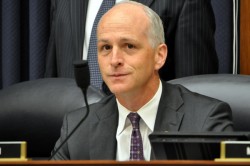National
House panel adopts anti-gay amendments in defense bill
Amendments reaffirm DOMA, could disrupt ‘Don’t Ask’ repeal

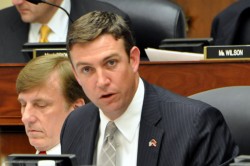
Rep. Duncan Hunter introduced an amendment that could disrupt 'Don't Ask' repeal (Blade photo by Michael Key)
A House defense committee approved on Wednesday a series of anti-gay amendments as part of major Pentagon budget legislation aimed at disrupting the process for repealing “Don’t Ask, Don’t Tell” and at demonstrating support for the Defense of Marriage Act.
The most high-profile amendment came from Rep. Duncan Hunter (R-Calif.), who introduced a measure that would expand the certification requirement needed for repeal to include input from the four military service chiefs. The Republican-controlled House Armed Services Committee voted 33-27 in favor of adopting the measure as part of the fiscal year 2012 defense authorization bill.
The vote in favor of the Hunter amendment was mostly along party lines, although Reps. Todd Platts (R-Pa.) and Chris Gibson (R-N.Y.) voted against the measure. Rep. Mike McIntyre (D-N.C.) was the sole Democrat to vote in favor of the measure.
The repeal legislation signed into law in December allows for repeal of “Don’t Ask, Don’t Tell” after 60 days pass following certification from the president, the defense secretary and the chair of the Joint Chiefs of Staff. Hunter’s amendment would expand the certification requirement to include input from the uniform chiefs of staff for the Army, Navy, Air Force and Marine Corps.
Hunter, a Marine Corps veteran of Iraq and Afghanistan, billed the amendment as a means to ensure the uniform military leaders — which he described “the ones that are actually responsible for the men and women under their care” — are able to express their opinion before moving forward with “Don’t Ask, Don’t Tell” repeal.
“Right now as it stands, the only folks that have to sign on to this are the president, who has never been to war or in ground combat, Adm. [Mike] Mullen, who, with all due respect to him, has never been to ground combat in Iraq or Afghanistan, and Secretary Gates, a political appointee, who is a very fine gentleman, but has never been in ground combat in Iraq or Afghanistan,” Hunter said. “I, and others in this room, have more combat experience than the people who would sign off on the repeal of ‘Don’t Ask, Don’t Tell.'”
Hunter emphasized his amendment would require the service chiefs to issue certification only based on their belief that “Don’t Ask, Don’t Tell” repeal wouldn’t harm morale and unit cohesion for combat arms units under their jurisdiction. According to the Pentagon survey published in November, these units are the most skeptical about whether open service would cause a disruption in the U.S. military.
Involving the military service chiefs in the “Don’t Ask, Don’t Tell” repeal certification process could disrupt or delay open service in the U.S. military because some uniform leaders of the military — notably Marine Corps Commandant Gen. James Amos — expressed opposition to passing repeal legislation last year. Amos has since said the Marine Corps would work to implement open service.
Despite the concerns that were expressed last year, each of the service chiefs testified in April that the process for enacting “Don’t Ask, Don’t Tell” repeal has been proceeding smoothly. Some service chiefs — including Chief of Naval Operations Adm. Gary Roughead — have said they oppose any effort to expand the certification requirement and they believe the defense secretary would adequately represent their views in the certification process.
Many Republican committee members voiced support for the Hunter amendment as they expressed opposition to implementing open service in the U.S. military.
Rep. Doug Lamborn (R-Colo.) said he supported the amendment because the president, the defense secretary and the chairman of the Joint Chiefs of Staff had already backed “Don’t Ask, Don’t Tell” repeal before Congress acted to end the military’s gay ban.
“I always felt the deck was stacked when the three people who were supposed to sign off on it, agreed to and had all been on record ahead of time saying what their preference was,” Lamborn said. “This broadens it, and, I think, adds more objectivity to the whole matter, and I think that that’s really good thing.”
Rep. Steve Palazzo (R-Miss.) said he opposes “Don’t Ask, Don’t Tell” repeal because he hasn’t encountered one American or U.S. service member who wants an end to the anti-gay law. Despite his remarks, polls found that around 80 percent of Americans favored ending the military’s gay ban at the time Congress repealed the statute.
Palazzo added he had a visit earlier today from about 85 veterans of World War II and said he believes they’d be displeased with “Don’t Ask, Don’t Tell” repeal.
“I don’t think that they would look upon this as progress,” Palazzo said. “I don’t think they’d look at this as the sacrifices they made for our families, for our country, for our allies, future generations of Americans — to see their military go down in flames by implementing [an end] to the DADT policy. Our men and women in uniform deserve better.”
But Democrats on the committee defended repeal of the law that Congress passed last year and said the current repeal process is working well.
Rep. Adam Smith (D-Wash.), ranking Democrat on the House Armed Services Committee, said the Hunter amendment troubled him because it suggests the president and the defense officials identified in the repeal law aren’t capable of making critical defense decisions.
“It’s a very, very dangerous thing to say that the president of the United States, the commander in chief; the secretary of defense; and the chairman of the Joint Chiefs of Staff are somehow not quite qualified to make important military decisions,” Smith said. “These are the same people that decide whether or not we go to war. They made a decision on whether or not to kill Osama bin Laden.”
Rep. Chellie Pingree (D-Maine) directly responded to the view expressed by Palazzo that World War II veterans would be unhappy with “Don’t Ask, Don’t Tell” repeal.
“Let’s not fool ourselves,” Pingree said. “Some of those soldiers were gay as well, and many of them took a long time to admit to that, or come out on that, but they’ve all been courageous in doing so and I think that they can’t be characterized as a generation that doesn’t want to see this change in the military.”
Although the committee adopted the amendment as part of defense authorization, passing such a provision into law would be challenging because the Senate would have to agree to it during conference negotiations and Obama would have to sign the measure.
Further, defense officials have testified that certification could happen mid-summer, and the final version of the defense authorization will likely not reach the president’s desk until after that time, rendering Hunter’s provision useless.
Alex Nicholson, executive director of Servicemembers United, expressed skepticism that the adoption of the Hunter amendment would impair the U.S. military’s ability to move toward open service.
“Despite the passage of this amendment within the ever-hostile House Armed Services Committee, it is highly unlikely that such an amendment would ever pass the Senate and be signed by the president,” Nicholson said. “The offering of this amendment was a shameful and embarrassing waste of time. The service chiefs have unequivocally said that they do not want this extra burden forced upon them, so if Congress really values their advice on this issue they should take it and forget this unnecessary and unwanted amendment.”
Hunter’s amendment was one of three anti-gay amendments the House Armed Services Committee approved on Wednesday as part of the defense authorization bill. Other measures affirmed the panel’s commitment to DOMA, which prohibits federal recognition of same-sex marriage.
The DOMA-related amendments were apparently inspired by Navy guidance on same-sex marriage that was made public this week.The guidance, which is dated April 13 and signed by Chief of Navy Chaplains Rear Adm. Mark Tidd, indicated military bases could be used for same-sex marriage ceremonies in states where such unions are legal and that Navy chaplains can officiate same-sex marriage ceremonies if they so choose.
However, following an outcry from conservatives, the Navy rescinded the guidance and said further legal review on the issue was necessary.
Rep. W. Todd Akin (R-Mo.) introduced an amendment mandating that marriage ceremonies on military installations must comply with DOMA and that chaplains can only officiate in their official capacity over such ceremonies if they comply with the anti-gay law.
The committee adopted the amendment as part of the Pentagon budget legislation by a vote of 38-23. Republican members of the panel were unanimous in their support for the measure. Reps. McIntyre, Larry Kissell (D-N.C.) and Mark Critz (D-Pa.) joined with the GOP to vote in favor of the amendment.
Akin said the amendment was necessary because he believes the recent Navy guidance demonstrates that the U.S. military was willing to skirt federal law.
“There is a federal law on the books and the military has decided they’re going to ignore that law,” Akin said. “That’s a very serious question. Does that mean that the law code on our books is an a la carte menu? Does that mean that the military can decide they’re going to change the rules of engagement and how they’re going to interrogate prisoners or [enforce] whatever particular law suits their fancy?”
Rep. Susan Davis (D-Calif.), who opposed the amendment, said the Navy guidance was the result of the Pentagon looking at how the U.S. military would look after “Don’t Ask, Don’t Tell.”
“We asked them to deal with these issues and to speak specifically to them,” Davis said. “So, when a facility is made available to such events, individuals who meet all the requirements for use of those facilities should not be denied access to the facility because of sexual orientation.”
Davis added the amendment restricts the right of chaplains to exercise freely their religious beliefs if they want to officiate at same-sex marriage ceremonies.
“Many chaplains represent faith traditions in which marriages between same-sex couples are celebrated and to prohibit them from doing so — to do that would be an attack on their rights with this amendment,” Davis said.
Although the Navy has said it will revisit the guidance, Davis said she’s confident the service will reach the same conclusion it had come to before.
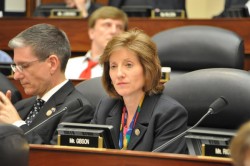
Rep. Vicky Hartzler introduced an amendment to ensure DOD policies comply with DOMA (Blade photo by Michael Key)
Another amendment came from Rep. Vicky Hartzler (R-Mo.), whose measure restated that the definition of marriage under DOMA as a union between one man and one woman applies to Defense Department regulations and policies.
The panel adopted the measure as part of the defense authorization bill by a vote of 39-28. The Republican members of the panel were unanimous in their support. Reps. McIntyre, Kissell and Silvestre Reyes (D-Texas) as well as Del. Madeleine Bordallo (D-Guam) joined the GOP to vote in favor of the measure.
Hartzler said the intention of the amendment was to reaffirm congressional support for DOMA and opposition to same-sex marriage.
“I think that this is a time for us in this Congress, the 112th Congress, to give our stance that we believe this is a wise policy and that marriage should be between a man and a woman,” she said.
But Smith, who opposed the measure, disputed the idea that the federal government should be involved in state regulation of marriage and questioned why the committee was taking up the issue when the panel’s area of jurisdiction is the U.S. military.
“I don’t think we need to be inserting into the Defense Authorization Act a Congress-wide view on how marriage should be defined, however we may feel,” Smith said.
Aubrey Sarvis, executive director of the Servicemembers Legal Defense Network, was particularly critical of what he said was invoking the more controversial debate over marriage in an attempt to derail “Don’t Ask, Don’t Tell” repeal.
“These adopted amendments to delay and derail repeal are a partisan political attempt to interject the same-sex marriage debate and other unrelated social issues into the NDAA where they have no place,” Sarvis said. “Make no mistake — these votes should be a wake-up call to supporters of open service that our work is not done. Our commitment to timely certification and repeal must be redoubled as we move to the House floor to defend the progress we have made to ensure that LGB patriots can defend and serve the country they love with honesty and integrity.”
Another anticipated anti-gay amendment didn’t see introduction before the committee on Wednesday. Palazzo was expected to introduce an amendment that would require conscience regulations for service members who have religious or moral objections to open service. His office didn’t immediately respond to the Washington Blade’s request for comment on why the measure wasn’t introduced.
After adopting the anti-gay amendments, the committee voted to report out the defense authorization bill to the floor by a vote of 60-1. Rep. John Garamendi (D-Calif.) was the sole panel member to vote against the legislation.
The Republican-controlled House will likely pass the defense authorization bill as a whole when the measure reaches the floor. A vote on the legislation could happen as soon as the week of May 23.
Federal Government
Mass HHS layoffs include HIV/AIDS prevention, policy teams
Democratic states sue over cuts

Tuesday began a series of mass layoffs targeting staff, departments, and whole agencies within the U.S. Department of Health and Human Services under Secretary Robert F. Kennedy Jr., who reportedly plans to cut a total of 10,000 jobs.
On the chopping block, according to reports this week, is the Office of Infectious Disease and HIV/AIDS Policy. A fact sheet explaining on the restructuring says “a new Administration for a Healthy America (AHA) will consolidate the OASH, HRSA, SAMHSA, ATSDR, and NIOSH, so as to more efficiently coordinate chronic care and disease prevention programs and harmonize health resources to low-income Americans.”
The document indicates that “Divisions of AHA include Primary Care, Maternal and Child Health, Mental Health, Environmental Health, HIV/AIDS, and Workforce, with support of the U.S. Surgeon General and Policy team.”
“Today, the Trump administration eliminated the staff of several CDC HIV prevention offices, including entire offices conducting public health communication campaigns, modeling and behavioral surveillance, capacity building, and non-lab research,” said a press release Tuesday by the HIV + Hepatitis Policy Institute.
The organization also noted the “reassignments” of Jonathan Mermin, director of the National Center for HIV, Viral Hepatitis, STD, and TB Prevention, and Jeanne Marrazzo, director of the National Institutes of Health’s National Institute of Allergy and Infectious Diseases. Both were moved to the Indian Health Service.
“In a matter of just a couple days, we are losing our nation’s ability to prevent HIV,” said HIV + Hepatitis Policy Institute Executive Director Carl Schmid. “The expertise of the staff, along with their decades of leadership, has now been destroyed and cannot be replaced. We will feel the impacts of these decisions for years to come and it will certainly, sadly, translate into an increase in new HIV infections and higher medical costs.”
The group added, “We are still learning the full extent of the staff cuts and do not know how the administration’s announced reorganization of HHS will impact all HIV treatment, prevention, and research programs, including President Trump’s Ending the HIV Epidemic initiative,” but “At the moment, it seems that we are in the middle of a hurricane and just waiting for the next shoe to drop.”
A group of 500 HIV advocates announced a rally planned for Wednesday morning at 8 a.m., at the U.S. Capitol lawn across from the Cannon House Office Building, which aims to urge Congress to help stop the cuts at HHS.
“Over 500 advocates will rally on Capitol Hill and meet with members of Congress and Hill staff to advocate for maintaining a strong HIV response and detail the potential impact of cuts to and reorganization of HIV prevention and treatment programs,” the groups wrote.
The press release continued, “HHS has stated that it is seeking to cut 10,000 employees, among them 2,400 CDC employees, many doing critical HIV work. It also seeks to merge HIV treatment programming into a new agency raising concerns about maintaining resources for and achieving the outstanding outcomes of the Ryan White HIV/AIDS Program.”
On Tuesday a group of Democratic governors and attorneys general from 23 states and D.C. filed a lawsuit against HHS and Kennedy seeking a temporary restraining order and injunctive relief to halt the funding cuts.
U.S. Centers for Disease Control and Prevention withdrew approximately $11.4 billion in funding for state and community health departments during the COVID-19 pandemic response, along with $1 billion to the Substance Abuse and Mental Health Services Administration.
“Slashing this funding now will reverse our progress on the opioid crisis, throw our mental health systems into chaos, and leave hospitals struggling to care for patients,” New York Attorney General Letitia James said.
State Department
Former US envoy for global LGBTQ, intersex rights slams Trump
Former President Joe Biden appointed Jessica Stern in 2021
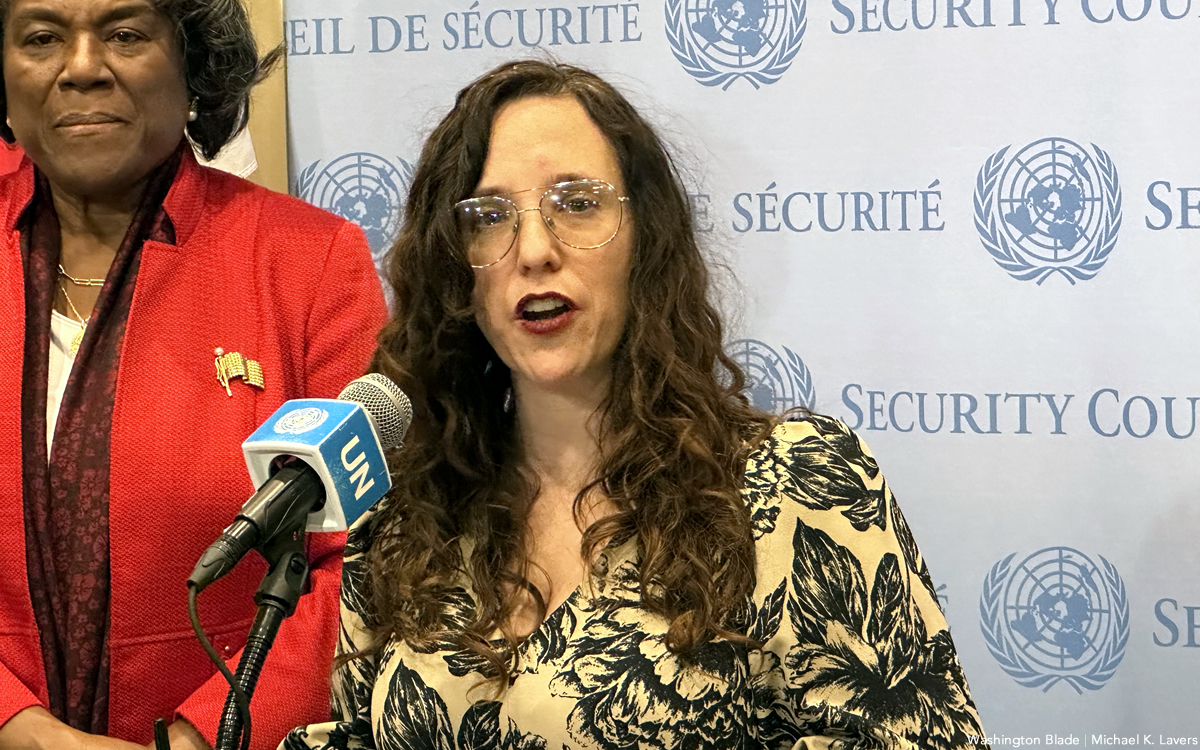
Jessica Stern, the former special U.S. envoy for the promotion of LGBTQ and intersex rights, says the work that she and her colleagues did under the Biden-Harris administration is “being systematically dismantled.”
“As the person who was responsible for leading U.S. foreign policy on LGBTQI+ issues, it’s been very difficult for the past two months to see that work being systematically dismantled,” she told the Washington Blade on March 19 during a telephone interview.
Stern was the executive director of Outright International, a global LGBTQ and intersex advocacy group, when then-President Joe Biden appointed her in June 2021.
The promotion of LGBTQ and intersex rights was a cornerstone of the Biden-Harris administration’s overall foreign policy. These efforts specifically included the decriminalization of consensual same-sex sexual relations and marriage equality efforts in countries where activists said they were possible through the legislative or judicial processes.
The Trump-Vance administration’s decision to freeze most U.S. foreign aid spending for at least 90 days has had a devastating impact on the global LGBTQ and intersex rights movement. President Donald Trump’s executive order that bans the State Department from issuing passports with “X” gender markers has prompted Germany and several other European countries to issue travel advisories for transgender and nonbinary people who are planning to visit the U.S.
Stern said the Trump-Vance administration “has studied the anti-LGBTQI strategies of other countries and basically imported the worst ideas from around the world: The most violent, the most dehumanizing, the most targeting strategies.” Stern added these policies have emboldened Hungarian Prime Minister Viktor Orbán, Russian President Vladimir Putin, Argentine President Javier Milei and other anti-LGBTQ heads of state.
“It’s one thing when a small country that has limited global reach implements anti-LGBTQI laws and policies. It’s another thing when one of the world’s superpowers does so,” Stern told the Blade. “There’s no question that the U.S.’s regression on LGBTQI rights is actually going to accelerate backlash against LGBTQI people around the world.”
“We provide political legitimacy to those ideas, but also we’re forging new alliances and coalitions, and we’re pushing these ideas on other countries,” she added. “So, it’s not a passive action. The U.S. government currently is actively funding and disseminating anti-LGBTQI hatred around the world.”
Former State Department colleagues ‘afraid every day’
The Trump-Vance administration in a Feb. 3 statement that defended its efforts to dismantle the U.S. Agency for International Development noted examples of the organization’s “waste and abuse” included $2 million for “sex changes and ‘LGBT activism'” in Guatemala and $1.5 million to “advance diversity, equity and inclusion in Serbia’s workplaces and business communities.” Secretary of State Marco Rubio last month said 83 percent of USAID contracts have been cancelled, and the remaining will “now be administered more effectively under the State Department.”
Rubio after the Trump-Vance administration froze nearly all U.S. foreign aid spending issued a waiver that allowed the President’s Emergency Plan for AIDS Relief and other “life-saving humanitarian assistance” programs to continue to operate.
The Blade has previously reported PEPFAR-funded programs in Kenya, South Africa, and elsewhere have suspended services and even shut down because of a lack of U.S. funding. UNAIDS Executive Director Winnie Byanyima on March 24 said 6.3 million more people around the world will die of AIDS-related complications over the next four years if the U.S. does not fully restore its foreign assistance.
Stern said her former State Department colleagues are “afraid every day.”
“They never know, ‘Am I going to be fired today?’ “Am I going to be put on administrative leave?’,” she said. “I cannot even imagine what it’s like to go to work every day.”
Stern told the Blade her former colleagues tell her that “there’s not a lot of foreign policy work happening because there’s so much disruption being caused by DOGE (the Department of Government Efficiency).”
“Entire departments have been decimated,” she said, noting one of them has lost 60 people. “It’s almost inconceivable to figure out how to restructure your work when your resources have been decimated.”

Stern described herself as “an eternal optimist” when the Blade asked whether she thinks the U.S. can ever stand for LGBTQ and intersex rights abroad.
“You have to believe in human rights,” she said.
Stern said former Secretary of State Antony Blinken as “an ally on LGBTQI issues.” Stern also said many of her now former State Department colleagues thanked her and her team for their work before they left government.
“There’s so much compassion from straight and cisgendered allies, from career officials, people that are not human rights experts or specialists, people that don’t focus on the well-being of LGBTQI people, but people that care very much about the United States standing for its values, the rule of law, equality for all, and this notion that it is in our national interest to ensure that there is safety, prosperity, and well-being for people around the world,” she said.
“The situation we find ourselves in will not last forever,” added Stern. “What we have to do is figure out how to hold the line right now, and how to organize for the future.”
She stressed ways to “hold the line” include litigation, protests, letters-to-the-editor, demanding accountability from lawmakers.
“There’s so much to do,” said Stern.
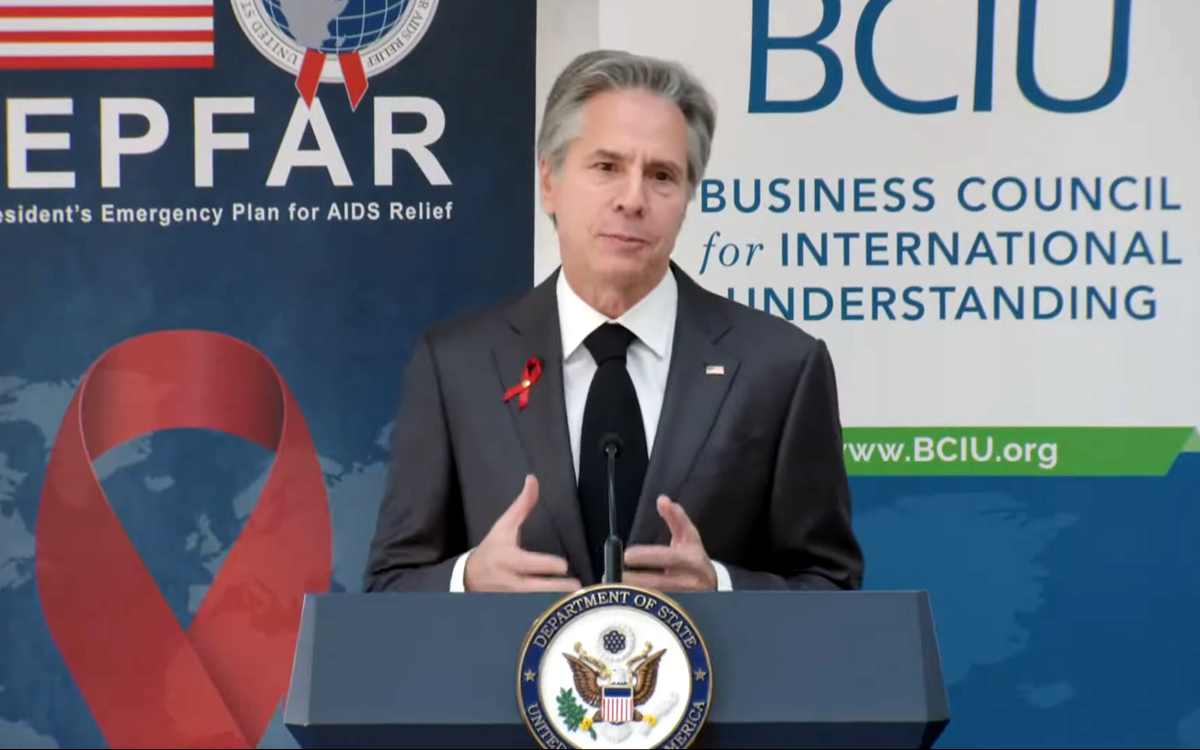
Stern is currently teaching at Columbia University’s School of International and Public Affairs, and is writing about her experience as the “first-ever human rights expert to be the special U.S. envoy for LGBTQI rights.” Stern also told the Blade that she is working to launch a new organization.
“I love being an activist again,” she said. “If there was ever a time when activists are needed, it’s now.”
“I am really proud to have rejoined the resistance,” added Stern.
National
Destination Tomorrow works to empower LGBTQ community
Sean Coleman is Black transgender man who founded group in 2009
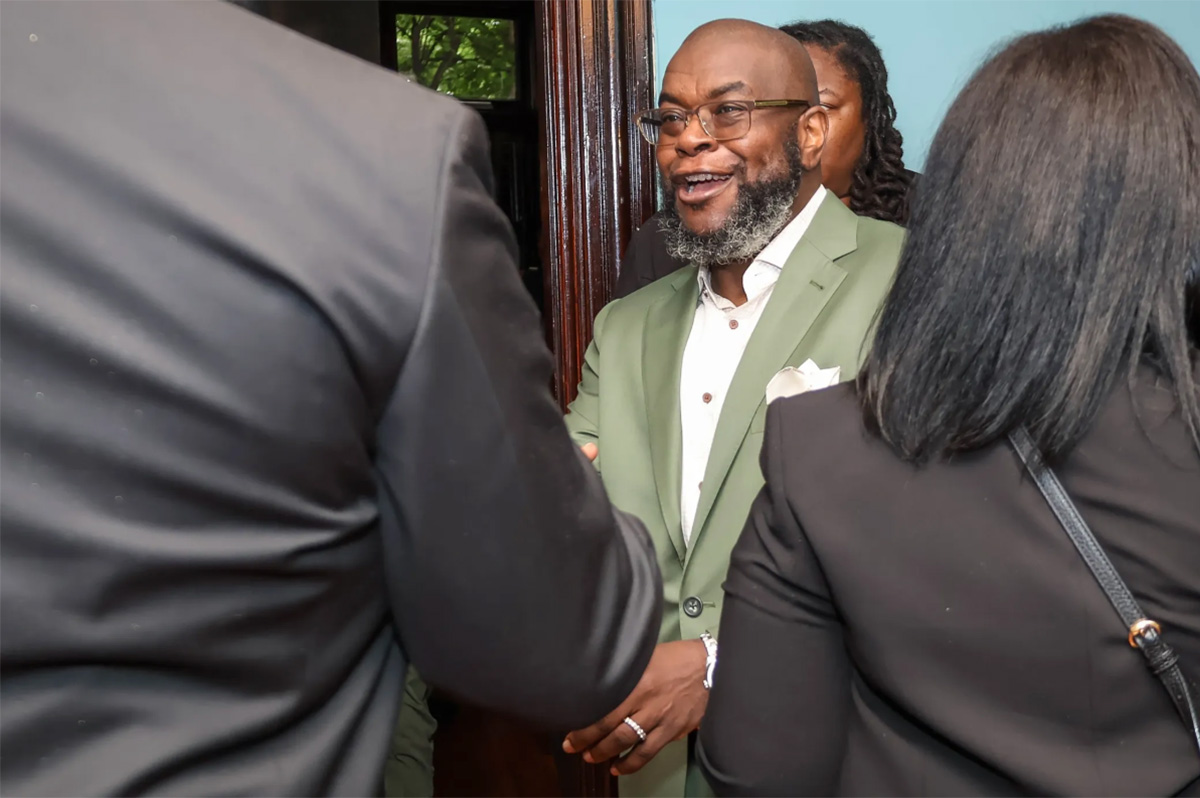
Sean Ebony Coleman became the first transgender African American to own and operate an LGBTQ center with the founding of Destination Tomorrow in 2009. Subsequent centers opened up in Atlanta in 2022 and D.C. in 2024.
Destination Tomorrow was founded on the idea that “it is more helpful to empower our most vulnerable TLGBQ+ community members in a way that takes them off the path of needing emergency care.”
“Our organization emphasizes economic, social, and mental empowerment through a variety of holistic educational, financial, support-based, housing, and health programs,” Destination Tomorrow said on the organization’s website.
With Transgender Day of Visibility today and WorldPride coming to D.C. this June, the Washington Blade spoke with Coleman to get some further insight into how Destination Tomorrow and other organizations are responding to the pressure the Trump-Vance administration is putting on the LGBTQ community.
BLADE: What was the overall reaction to the Trump administration and the heavy anti-LGBTQ rhetoric being pushed by the administration from Destination Tomorrow?
COLEMAN: I think the first thing was disbelief, right? You know he’s not well versed, but the embellishments about the community, particularly the trans community, were so outlandish that they became dangerous. So I think the first thing was, people actually believe this, and we have a message in problem because we’re not responding. We really missed an opportunity to message that differently. Like some of them it was so easy for us to respond and say, “We’re talking about the entire sports world when it comes to college and high school” and those kinds of things, right? We are definitely focusing on the wrong one percent.
I knew it was like collectively as a trans man, just personally, I was like “okay, so how do you show up now?” You’re in a position that folks expect you to at the very least have something positive to say next steps, this is what we’re gonna do, marching all this, whatever. I’m sitting with it like, no, I’m a little nervous. In the moment, most of the danger and most of the rhetoric is happening towards trans and gender nonconforming people and unfortunately, Black and brown and trans and gender nonconforming folks feel it worse when things like this happen.
BLADE: With a lot of organizations getting threats, losing funding, and everybody just being scared, has Destination Tomorrow specifically received any higher amounts of traffic to your locations, either here or other states?
COLEMAN: All three locations have seen an uptick. Funny thing a lot of them are coming in because they just want community. and we do that intake assessment. Then we say “while we have you here, we could do all of these other things.” But it’s really about them coming for community. If you know anything about us, we’re well versed in the house and ballroom community. So we put on balls. We’re planning one now.
And the young people, particularly young trans people, are also coming in for the ball, but they also want to know. Mr. Coleman, what can we do now? What is it? They want a call to action, want to be motivated and I think we have to figure out again this one message of where we’re going to go. Whether it is New York, Atlanta, and D.C., Destination Tomorrow is then going through all of the other trans into the nonconforming organizations. Speaking in one voice and figuring out what movement building looks like for us in this moment and we think that young people should drive it.
Particularly in New York and D.C. will receive some additional resources because we want to be able to address those folks that are going to come in. We want to make sure (to have enough) staff, (increase) our hours. We increase our security and our security presence because that was something that we were concerned about, even if it’s just an in person meeting that we’ve been doing for the last five years, because how do we keep those meetings and that meeting space and our identity safe?
BLADE: Do you feel like given the recent federal government layoffs and this whole Trump takeover of Washington, like, do you think D.C. is prepared or safe enough to start implementing those things that you want to try and get done?
COLEMAN: Yes. I think once we’ve taken a moment to step back and assess the situation, we will be able to come out stronger with the initiative that is going to be most important and most impactful for our community, but I think it is going to take some collaborative effort. I don’t think one agency is gonna be able to do it. I think this is a time for collaboration and allies. um, and not in that order. Right? But D.C. is definitely a safe place for LGBT community members worldwide.
It’s gonna be an amazing time. We’re gonna get an opportunity to show how resilient our community is, how much love we still receive. If you look at some things on social media, it’ll seem like everyone’s demonizing the trans and general nonconforming community and that’s not necessarily the case, right? I think we get sucked into this vacuum with social media and I think once you log off and you actually go outside, you recognize exactly how much support you have from your community. And I think that ties back into our messages. We’re not going to stand around sad and defeated. We’re going to show up, have a good time with WorldPride.
I also see it as an excellent opportunity to strategically put some plans in place. While we have you here, and we’re celebrating, we’re partying, but here is what our next steps will be. We have at least two or three next steps that collectively, you can go back down and all of us a picture goes saying two or three things. Say the same things, stay on message and I think World Pride will be an excellent opportunity to do so.
Along with the comments on TDOV and WorldPride, Coleman also spoke about the current state of LGBTQ politics.
“What’s so unfortunate for me is that we lean into our allies, right? Now is the time for our allies to take a look around the room and say “Oh wait. This person is missing [in the conversation], we should not be speaking on behalf of Black and brown people,” he told the Blade. “I specifically say Black and brown trans people. [Allies] shouldn’t be speaking on behalf of them because I know a few that can actually come here and speak on their own behalf and unfortunately it doesn’t happen. I think it’s because it’s tied into the losing funding across the board. So those LGB organizations are gonna feel that loss. And at some point they may feel like they have to step in and fill a void that they don’t necessarily have to because we’re here.”
Specifically in New York, Coleman has been looking toward the local government to help Destination Tomorrow and other organizations stay protected and operational during times like these.
“Trans, gender nonconforming and LGB issues go across different issues. Whether we’re talking about housing, criminal justice reform, or reproductive rights. We should be included in those discussions, and we should be included in those funding opportunities,” said Coleman. “And I think this gives us an opportunity to show that Destination Tomorrow has a program called Pride at Work. to the workforce development program, where we’re pitching it in D.C. and we’re actually in our third year of doing it in New York City. That’s an example of how workforce development should be for all of us, right?”
“So a lot of the work we’ve done in the last couple of months is really meeting with all our elected officials and saying, ‘This is the message that we’d like you to push. This is what we want to say, this is how we feel. Because you are not saying it, it feels like you left us behind. This is where you are missing the mark and it is up to you to fix it,’” he added.
A discussion for New York mayoral candidates took place later that evening. One of the things that Coleman wanted to heavily iterate to the candidates was that “at the end of the day, we’re paying attention now. We may not have been as politically engaged as we should have been, but we are now.”
-

 Maryland3 days ago
Maryland3 days agoAt transgender visibility celebration, Moore called out for lack of action
-
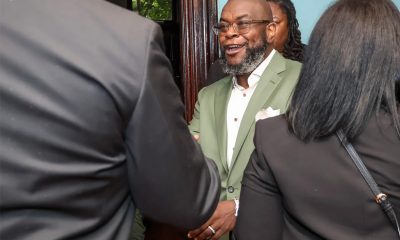
 National3 days ago
National3 days agoDestination Tomorrow works to empower LGBTQ community
-

 Federal Government2 days ago
Federal Government2 days agoMass HHS layoffs include HIV/AIDS prevention, policy teams
-

 Arts & Entertainment3 days ago
Arts & Entertainment3 days ago‘Think of those who have not been seen,’ Cynthia Erivo’s powerful message at GLAAD Awards

